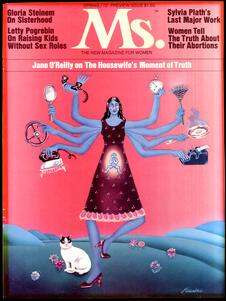Letty Cottin Pogrebin
I started working on this article in the fall of 1980, in response to the anti-Semitic incidents that had besmirched the United Nations conference in Copenhagen. I wanted to discover whether those outbursts were peculiar to women operating in an international context, or whether some comparable form of anti-Semitism existed among feminists in the United States. So I spent 18 months doing in-depth interviews with more than 80 women from all parts of the country and writing the piece entitled “Anti-Semitism in the Women’s Movement” that eventually appeared in the June 1982 issue of Ms.
The minute the magazine hit the newsstands, I was invited to discuss anti-Semitism on television and radio, at universities from Yale to UCLA, and at public forums sponsored by Jewish groups ranging from the New England Anti-Defamation League to the Jewish Center of Dallas. The article was reprinted twice and was photocopied innumerable times as a catalyst for friends and enemies to discuss the problem in classrooms, meetings, and living rooms from Anchorage to Miami, from Toronto to Jerusalem.
Things have changed since my article was published in 1982. An affirmative Jewish feminism has flourished in secular contexts. But while thousands of women have claimed or reclaimed their Jewishness in proud, positive ways, Jewish negativity and shame are also flourishing.
After evaluating the results of my anti-Semitism survey and writing the article for Ms., I saw the importance of being a public, affirmative Jew – even when ethnicity or religion “didn’t matter.” As much as I might wish for a world of universalist values and de-emphasized differences, I would no longer tolerate a women’s movement in which Jews are the only group asked to relinquish their own interests while other women were allowed to push their private agendas and subvert feminist ideals when it suited them. I would no longer assume all women were my sisters.
I still have universalist dreams – visions of one world without the rancors of nationalism, tribalism, and patriarchy – but now I dream them only when fully awake, and I take my inspiration not from some naive UNICEF greeting card but from a pluralist feminism founded on a mutual respect for each other’s “identity politics,” which include the particularities of culture, peoplehood, and history.
Adapted from Deborah, Golda, and Me, Crown Publishers, 1991.
Letty Cottin Pogrebin earned her B.A. from Brandeis University and became a writer and strong advocate for women’s rights in the early 1970s. In 1971, she was one of the founding editors of Ms. magazine, where she worked for 17 years, and a co-founder of the National Women’s Political Caucus. She was also a consultant on Free To Be You And Me, an album of non-sexist children’s stories and songs, and edited Stories for Free Children. When the United Nations International Women’s Decade Conference equated Zionism with Racism in 1975, Pogrebin was provoked to combat anti-Semitism within the women’s movement just as she fought sexism within Judaism. Over the last three decades, Pogrebin has been a fixture in feminist, Jewish, and Jewish-feminist causes, as well as an outspoken political activist on issues including hunger, the Israel-Palestine conflict, and Black-Jewish relations. She is a prolific author whose publications include Getting Yours: How to Make the System Work for the Working Woman; Growing Up Free: Raising Your Child in the 80s; Deborah, Golda, and Me: Being Female and Jewish in America; and Three Daughters.




